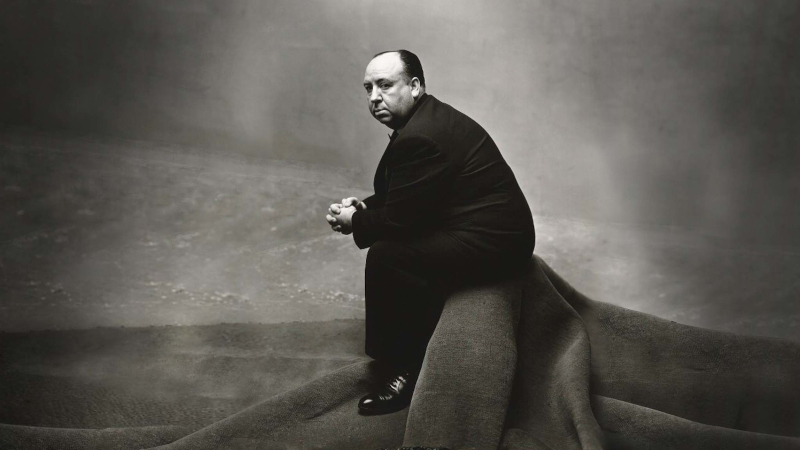Director – Mark Cousins – 2022 – UK – Cert. 15 – 120m
*****
Idiosyncratic documentary is a personal journey through Hitchcock’s movies narrated by the legendary director himself – out in UK cinemas on Friday, July 21st
Hitchcock having been dead for over four decades, he doesn’t actually narrate this film. The voice over is instead a convincing impression by Alistair McGowan and even though you know it’s a trick, you soon settle in to the idea that Hitch genuinely recorded a voice over for this film. Cousins even plays along with the odd, “yes, Mr. Hitchcock.”
Cousins has these days established himself as a documentarian of cinema, covering subjects as integral as the act of looking itself (The Story Of Looking, 2021) and key directors such as Orson Welles (The Eyes Of Orson Welles, 2018). He’s very knowledgeable on cinema and numerous other subjects, and the effect is rather like spending a pleasant evening chatting in the pub with a friend possessing these skillsets (albeit a pub equipped with the ability to unobtrusively show film clips as and when needed). He’s also very much his own man, a superb communicator with his own unique way of looking at things, so you’d expect a film about as well known a director as Hitch to be not only well-informed about its subject but also to offer some unique insight or perspective that mark the production out as coming out of Mark Cousins’ head.
On the first count, he manages to include clips from most if not all of Hitch’s feature films provided you don’t include the wartime propaganda shorts and the one that’s been lost for as long as anyone can remember (his second film, The Mountain Eagle, 1926). On one viewing, I think I spotted everything except Rich And Strange (1932) and I’m guessing my attention must have momentarily wandered when it came up because I can’t believe that isn’t in there. Certainly some of the early, arguably quite unremarkable, workaday films which he made (the collaborative studio promo Elstree Calling, 1930; the Johan Strauss biopic Waltzes From Vienna, 1932) are among the clips. And to his great credit, Cousins (or Hitch) doesn’t necessarily go for clips from the well known films over the less familiar ones, nor does he go for the clips that everyone knows. So Psycho (1960) is primarily represented by the scene with Janet Leigh and the used car salesman while Blackmail (1930) delivers the beautifully designed and highly memorable shot moving up the side of a stairwell. And there are a lot of clips from the less famous of the early British films.
On the second count, like everyone else connected with the movie business, Cousins has his own pet theories about Hitch, dividing the films into six categories and constructing his documentary around them: escape, desire, loneliness, time, fulfilment and height. He then proceeds to put the films into one or more categories. If you don’t know the films at all, it’s a great introduction (although there are many others documentaries out there that provide equally good entry points into his work, for instance 78/52, Alexandre O. Philippe, 2017, not to mention a plethora of books about the director and / or his films). And if you do know the films, and have watched archive footage of Hitch talking, it’s like spending two hours in the company of an old friend. Even though this Hitch who verbally speaks to us is not the real thing but a fabrication.
Cousins’ Hitchcock / McGowan construct purports to be mostly telling the truth, but admits to the occasional lie. Weirdly, this reminded me of a feature by not Hitchcock but Welles, the documentary F For Fake (1973), in which the director, appearing as himself, promises to tell the truth for the first hour then spends the final reel lying his head off. Cousins doesn’t do exactly that here, but it wouldn’t surprise me if this trick from Welles’ documentary was a major inspiration when Cousins put the current film together.
Given Hitch made over 50 movies and Cousins tackles them in two hours, there are inevitable omissions – it would have been quite something to have had Hitch’s jocular take on feminism and #metoo given his notorious, Svengali-like fixation on and obsession with one or two actresses (Vera Miles, Tippi Hedren) and there’s little of his work shown shown outside the feature films, which is odd considering that his opening introductions on the the Alfred Hitchcock Presents TV show (1955) bought him far broader fame than his movies did and provided the templates for the hilarious trailers for Psycho and The Birds (1963).
No complaints from me, though, because this journey through numerous Hitchcock film clips proves thoroughly entertaining for newcomer and Hitchcock buff alike.
My Name Is Alfred Hitchcock is out in cinemas in the UK on Friday, July 21st.
Trailer:
